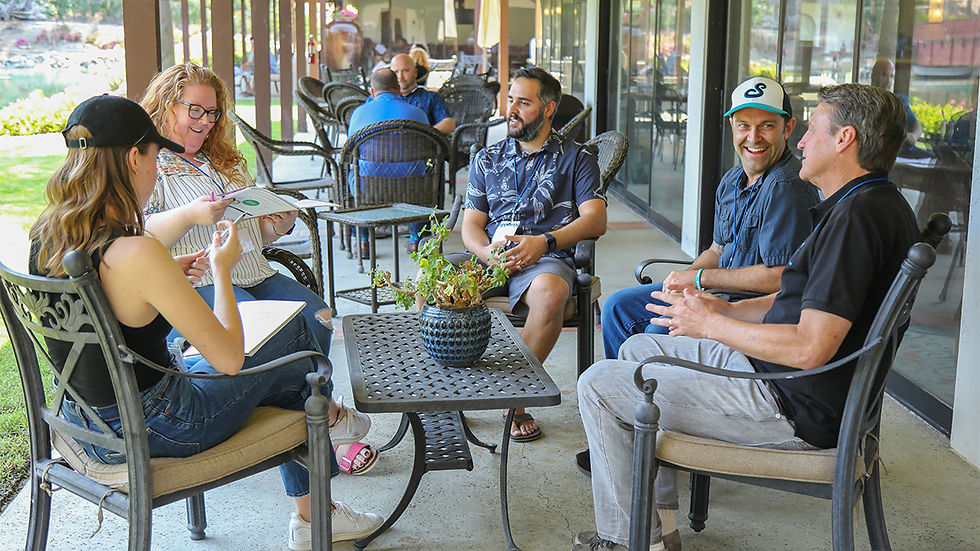Too Many Ministry Team Autopsies?
- Del Fehsenfeld
- Jul 22, 2025
- 4 min read

Picture a ministry team bursting with promise: a visionary pastor, a gifted worship leader, a detail-oriented organizer, and an energetic children’s director, all united to launch transformative outreach. Their shared passion fuels big dreams; but within months, cracks begin to appear. Meetings grow tense, deadlines slip, and enthusiasm wanes. Misunderstandings snowball, frustrations flare, and their vision collapses, leaving disappointment and the big question: What went wrong?
At Consentia Group, we’ve seen the aftermath of too many promising ministry teams that never reached their potential. We’ve listened to the stories, the regrets, and the lessons—what we sometimes refer to as “ministry team autopsies”—those hard but necessary reflections on how things fell apart.
And while every team’s story is different, one theme shows up again and again: relational breakdown. Misaligned motives, unspoken expectations, and unmanaged conflict slowly erode trust and momentum.
That’s why the solution lies in leveraging relational intelligence (RQ) through the Strength Deployment Inventory 2.0 (SDI). Our TeamLife program uses this framework to align motivations, harness strengths, manage overdone tendencies, and navigate conflict, all grounded in gospel-centered love.
Why Teams Fail
Too often, what begins with shared purpose unravels—not from a lack of vision, but from a lack of understanding. The SDI reveals that breakdowns stem from a lack of insight into team members’ core motivations. Without understanding what drives each person, miscommunication festers, conflict escalates, and collaboration stalls, landing teams on the autopsy table.
The SDI identifies three Motivational Value Systems (MVS): People (Blue), prioritizing care and harmony; Performance (Red), driven by action and results; and Process (Green), valuing logic and independence. This blend of motivations, rooted in our God-given longings for acceptance, significance, and security, shapes teamwork. When they clash—say, a Blue’s need for consensus slows a Red’s push for speed—tension arises. Relational intelligence transforms these fault lines into bridges.
Relational Intelligence: The Bridge
Relational intelligence refers to the ability to understand and adapt to others’ motivations, particularly under stress. It’s about aligning interactions to build stronger relationships. Through our TeamLife program, which integrates the SDI with a biblical vision for soul development in Christ, teams learn how to prevent missteps and how to thrive relationally and spiritually.
Step 1: Understand Core Motivations
Each team member brings a unique motivational lens. The SDI’s “triangle” maps these, showing where individuals fall. A Blue-motivated worship leader might focus on inclusive, heartfelt services, while a Green-motivated organizer emphasizes precision. Recognizing these differences helps teams value diverse contributions. An SDI assessment creates a shared language, fostering not only empathy and understanding but more effective communication. For example, a Red-motivated youth pastor’s push for quick decisions might frustrate a Blue-motivated care pastor valuing group input. RQ bridges this by providing categories to balance action and inclusion.
Step 2: Leverage Strengths, Manage Overdone Strengths
The SDI highlights strengths tied to motivations: Blue excels in empathy, Green in analysis, and Red in decisiveness. These are vital, but overdone strengths become liabilities. A Blue’s listening might avoid tough decisions, stalling progress; a Red’s decisiveness can turn impulsive, alienating others. The SDI helps teams recognize and calibrate these tendencies, ensuring balance and progress. And everyone on the team can learn to unlock and utilize strengths adaptively for love and effectiveness in the many contexts of ministry and relationships.
Step 3: Navigate Conflict with Purpose
Conflict in ministry feels weighty due to the spiritual stakes involved. The SDI shows how motivations shift under stress: some accommodate, some assert control, and others retreat into logic. RQ focuses on intent, not just behavior. When someone snaps in a meeting, teammates can see it as an attempt to push through a problem, not just a personal attack. Identifying and including underlying motivations helps de-escalate conflict and refocus teams on shared goals. It also brings awareness for addressing conflict at a deeper soul level, enabling individuals and teams to more effectively live out their values as Christ-followers.
Step 4: Build a Culture of Collaboration
Preventing autopsies requires a culture of RQ. Leaders model this by sharing their motivations, inviting feedback, and addressing overdone strengths. Regular SDI check-ins via TeamLife keep teams aligned. Role-playing and team-building exercises strengthen cohesion, creating teams that weather challenges with unity.
From Autopsies to Vitality
Failed teams lead to burnout and missed opportunities. RQ, through the SDI, turns pitfalls into growth:
Understanding motivations aligns purpose
Leveraging strengths maximizes impact
Managing overdone strengths prevents derailment
Navigating conflict builds resilience
At Consentia Group, we’ve seen TeamLife transform ministry teams. Even ministry teams fractured by clashing personalities and bad history can use the SDI to map motivations, resolve conflict with empathy, and become equipped to move forward with renewed unity.
Don’t wait for the autopsy. Invest in relational intelligence through TeamLife. By understanding motivations, celebrating strengths, and navigating conflict with grace, your team can thrive, fulfilling its mission with vitality—one relationship at a time.
Ready for your next step?
Become a certified SDI Facilitator through Consentia Group and gain the tools to help your team thrive through deeper understanding, healthier communication, and gospel-centered collaboration. We’re offering two sessions this fall in September and October. Click below to learn more and register:
%20(1).png)
.png)




Comments